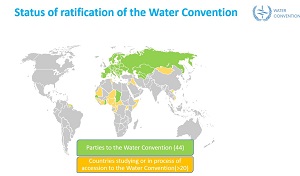Reviewing progress on transboundary water cooperation in the world
 |
40 percent of the world’s population lives in one of the 275 transboundary river basins. Transboundary waters account for 60 percent of the world’s freshwater flows. Cooperation for the management of shared water resources is therefore crucial for economic development, peace and environmental protection as well as for the achievement of the SDGs. It is even more crucial now, when the COVID-19 pandemic showed the absolute necessity to provide safe and sufficient water and adequate sanitation and hygiene to all to protect human health.
In this context, more than 200 experts representing governmental authorities from 78 countries, joint bodies, non-governmental as well as international organizations academia and the private sector reviewed progress during the 15th meeting of the Working Group on Integrated Water Resources Management (30 September-2 October).
Participants warmly welcomed Ghana as the 44th Party to the Convention on the Protection and Use of Transboundary Watercourses and International Lakes (Water Convention, serviced by UNECE).
Ben Ampomah, Executive Secretary of Water Resources Commission of Ghana, which acceded to the Convention in June 2020, highlighted “the need for international legal agreements, specifically the 1992 Water Convention and the 1997 Watercourses Convention, to serve as vital tools to guide, foster and secure the required transboundary water cooperation” and encouraged other interested countries to join the global Water Convention. Ghana’s accession was welcomed by Ardak Zebeshev (Kazakhstan), Chair of the Convention, and Peter Kovacs (Hungary), vice-Chair, as well as by Jean-Paul Adam, Director of Technology, Climate Change and Natural Resources Management at the United Nations Economic Commission for Africa, who indicated readiness to support countries interested in acceding to the Convention.
Numerous other countries reported significant advances in their national processes of accession to the Water Convention, including Burkina Faso, Cameroon, Central African Republic, Côte d’Ivoire, Iraq, Nigeria, Paraguay, Tanzania, Togo and Uganda.
Participants reviewed progress achieved during the last year in the implementation of the programme of work of the Convention, including increased application of the Convention’s principles, promotion of an integrated and intersectoral approach to water management at all levels and facilitation of financing of transboundary water cooperation.
Two tools under development were presented: a handbook on water allocation in a transboundary context, and a checklist on the development of legal frameworks for transboundary water cooperation.
Participants also welcomed progress in the second reporting cycle on transboundary water cooperation, with 110 countries having submitted national reports on SDG indicator 6.5.2 (out of 153 countries sharing transboundary waters) so far.
Preparations for the 9th session of the Meeting of the Parties to the Convention, that will be held in Tallinn from 29 September to 1 October 2021, were presented by Estonia, including the upcoming identification of priorities for future work under the Water Convention.
For more information, please visit: http://www.unece.org/index.php?id=52818
















































Yorumlarınızı Bizimle Paylaşın
Sadece üyelerimiz yorum yapabilir, hemen ücretsiz üye olmak için Tıklayın